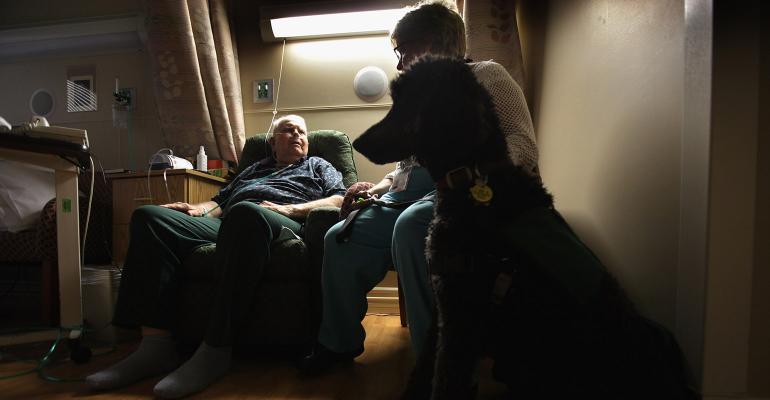Does providing pet visitation as therapy to hospitalized individuals and nursing home residents further an Institute’s exempt purposes under Internal Revenue Code Section 501(c)(3)? In Private Letter Ruling 2017-19018 (released May 12, 2017), the Internal Revenue Service answered, “yes.”
The Program
The Institute, which is an IRC Section 501(c)(3) organization, conducts oncology research and education. To increase the psychological and emotional condition of hospital patients and elderly residents living in nursing homes, the Institute wants to start a pet therapy Program (the Program), whose goal is to provide playful interaction between therapy dogs and hospital inpatients (consisting mostly of children), and between therapy dogs and elderly nursing home residents. All of the dogs will be health certified, trained and tested to act as therapy dogs. Therapy sessions, which will take place at hospitals and nursing homes, will be free to patients and residents.
Volunteer handlers will have to pass a background check, have insurance and be trained and certified to conduct pet therapy sessions. Dog owners who offer their pets for participation in the Program will be responsible for the cost of training, certifying and registering their dogs as therapy dogs.
The Institute will be responsible for ascertaining whether a hospital or nursing home could benefit from the Program. If the recommendation is “yes,” the Institute will enter into an agreement with that particular hospital or nursing home to provide the pet therapy on a regular weekly basis.
Furtherance of Exempt Purpose
The Institute asked the IRS whether providing pet visitation therapy to hospitalized patients and nursing home residents is in furtherance of the Institute’s exempt purposes under Section 501(c)(3). Section 501(c)(3) describes entities that are organized and operated exclusively for charitable, educational, scientific, and certain other purposes. Under Treasury Regulations Section 1.501(c)(3)-1(c)(1), an organization will be regarded as “operated exclusively” for one or more exempt purposes only if it engages primarily in activities which accomplish one or more of such exempt purposes specified in Section 501(c)(3). In this instance, the IRS examined whether an organization—the Institute—which will provide for the non-medical needs of a hospital’s patients or nursing home residents, will be carrying out an exempt purpose under Section 501(c)(3).
Several revenue rulings address this issue. For example, in Revenue Ruling 68-73, the IRS found that an organization that attended to the non-medical needs of a proprietary hospital’s patients, through reading to them and providing other personal services to them to improve mental health and physical comfort, carried out its exempt purpose. Similarly, in Rev. Rul. 72-124, the IRS concluded that an organization formed as a home for the elderly is an exempt organization, because the elderly are highly susceptible to forms of distress, and alleviating their distress may, in certain circumstances, constitute a charitable purpose.
The Institute
In the instant case, the IRS concluded that services that lessen distress in hospital patients and in the elderly constitute a charitable purpose:
A hospital patient, particularly if he or she is a child, may suffer mental and physical distress … due to being in an unfamiliar and stressful environment. An elderly nursing home resident may suffer from social isolation, loneliness, and depression … The Program will offer hospital patients, particularly children, and elderly nursing home residents the opportunity to participate in pet therapy sessions … These sessions will be conducted with the goal of lessening distress, improving mental well-being, and encouraging socialization.
As such, the IRS ruled that the Program furthers the Institute’s charitable purposes under Section 501(c)(3).





